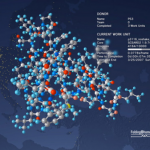 Recently a number of studies have explored the effectiveness of non-profit usage of social media. Focusing primarily on large social networks such as Facebook, the conclusion was that efforts to raise funding and awareness were often not as effective as other channels.
Recently a number of studies have explored the effectiveness of non-profit usage of social media. Focusing primarily on large social networks such as Facebook, the conclusion was that efforts to raise funding and awareness were often not as effective as other channels.
It’s enough to make many a non-profit conclude that social media isn’t for them, and they may have a point, were it not for the tremendous work being done across various applications of citizen science and crowdsourcing. Of course, most applications of crowdsourcing or citizen science involve people giving up their free time and brainpower to work on particular challenges that are of interest to them.
Not all though. Folding@home was one of the pioneers of crowdsourcing. The project, which began in 2000 out of Stanford University, taps into the idle processing time of the 200,000 or so personal computers that volunteers have donated to the cause. The aim is to stimulate the transition of a protein between its inactive and active state.
During their decade or so of operation, well over 100 papers have been published based upon the work done by the distributed network of computers. The latest such paper was published recently, and focuses on the role of kinases.
The general role of kinases is to act as an intracellular “molecular switch” that activates other proteins, enabling the cell to carry out its normal duties. Kinases play a particularly important role in regulating cellular growth. Cancer cells corrupt this process and rev up kinase production and activation, causing the cancer to grow and spread unchecked.
To date, there have been relatively few cancer drugs that have successfully targeted and inhibited kinases. The trick is to hit the disrupted kinase at the root of the cancer and to turn it off, without affecting many other similar kinases that are critical, for instance, to heart or kidney cells.
It’s easy to assume that social only means Facebook, Twitter et al. The enduring success of sites such as Folding@Home and Galaxy Zoo however show that there is much more than meets the eye.
I've had the SETI thing on my computer for donkeys years. Not sure that has been anywhere near as successful!
You only have to look on Facebook to find aliens. SETI are looking in all the wrong places.